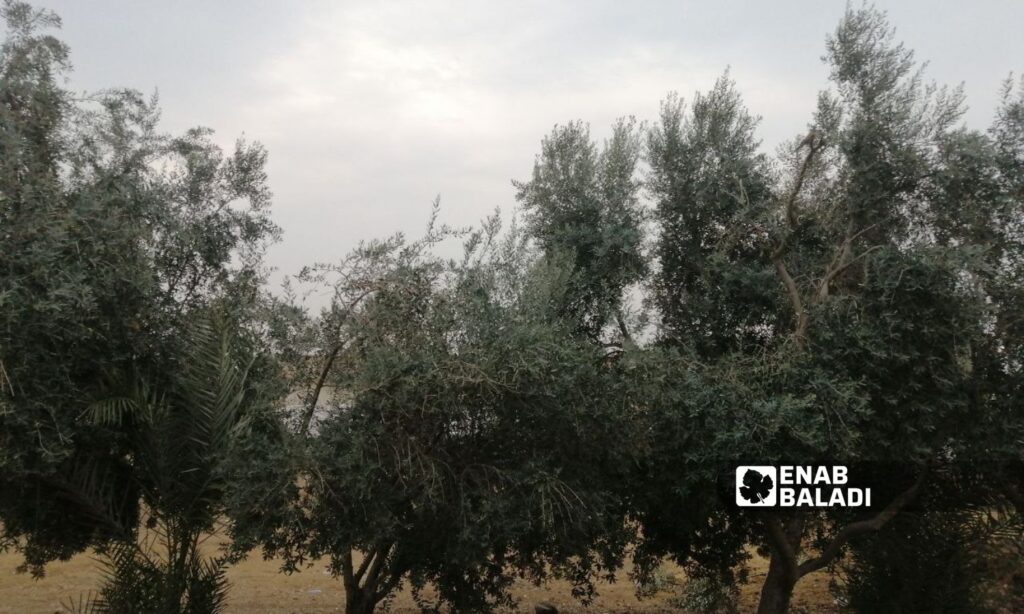Deir Ezzor – Obadah al-Sheikh
This year, olive farmers in the eastern countryside of Deir Ezzor, which is under the authority of the Autonomous Administration of North and East Syria (AANES), found themselves forced to harvest their crops early or sell a large portion of them to local merchants. These merchants then gather the olives and transport them to the city of Raqqa for sale or pressing in the available presses there.
At the same time, some farmers have decided to keep a portion of their own production, which in the best cases did not exceed 35 kilograms from a single tree.
Difficulties and shortage of presses
Farmers in Deir Ezzor countryside have resorted to early olive harvesting this year, knowing that the produced oil will be of low quality.
Farmers in several villages of Deir Ezzor face difficulties due to the absence of olive presses, leading to increased costs of the pressing process and transportation.
Enab Baladi visited the olive groves in the town of al-Shaafa, which is part of the al-Bukamal region in the eastern rural Deir Ezzor, to observe the situation. Ahmed al-Hamad, one of the farmers, told Enab Baladi that the difficulties include the lack of continuous electricity, shortage of fuel, and the support provided by the Fuel Committee in the Autonomous Administration. There are also high costs associated with equipment repairs.
He noted that the price of an olive oil tin can has significantly increased, reaching nearly $75.
Al-Hamad mentioned that transportation costs pose an additional burden on the farmers due to the absence of presses in the area. As a result, farmers are forced to press their crops in Raqqa governorate, knowing that these presses are unable to meet the region’s needs.
Muneer al-Khalaf, another farmer from Deir Ezzor’s eastern countryside, also stated that the production of olives in rural Deir Ezzor is very low, and farmers are obliged to transport their crops to the city of Raqqa for pressing. This has led to increased costs and raised the prices of oil.
He explained that rural Deir Ezzor has only one olive press that was recently opened, but its production capacity is not sufficient to process large quantities of olives at once due to its reliance on primitive methods.
Al-Khalaf talked about the impact of the rising prices of olive oil on the lives of the locals, especially since it is used in many Eastern dishes and sweets. Some have given up using olive oil due to the high prices and turned to using local animal fat (butter).
Few types of oil
In an interview with Enab Baladi, the olive oil merchant in Deir Ezzor’s eastern countryside, Ahmed Rifat, stated that the majority of olive trees in the region are of the “Khishabi” type, which produces one kilogram of oil from every ten kilograms of olives.
He mentioned the existence of other types of trees, such as “Zayati,” which produces one kilogram of oil from every five kilograms of this type.
Rifat believes that the spread of these trees in most areas of Deir Ezzor, coupled with the absence of olive presses in the rural area under the control of the Syrian Democratic Forces (SDF), has increased the suffering of the farmers.
Rifat collects the crops of the region’s residents and transports them to Raqqa city for pressing, explaining that the cost of pressing each kilogram of olives ranges between 800 and 1000 Syrian pounds. This forces many farmers to either sell their crops or bear the burdens of high transportation and pressing costs.
In addition, Rifat emphasized the necessity for olive farmers to adhere to the conditions specified by the press owners in order to obtain high-quality olive oil. This includes harvesting the fruits at the appropriate time according to the varieties, cultivation conditions, and weather conditions. It is preferable to harvest when 60% of the fruits are colored to obtain olive oil with distinctive sensory properties.
He also stressed the importance of transporting the fruits to the press within 72 hours of harvesting them to avoid fermentation and rotting inside the bags and to prevent negative effects on the quality of the oil, such as “moisture, alcoholic, and moldy taste.”
He also advised to separate the branches, leaves, and impurities from the olive fruits to avoid negative effects on the pressing machines and ensure that they do not affect the sensory specifications of the oil.

